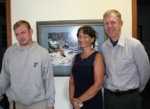Kissels sharing autism experiences Tuesday

Even after living with a child affected by autism for 24 years, Dr. Steve and Jana Kissel will admit they "don't know much" about the brain disorder.
They actually know a lot more about autism than the general public, and the Greencastle couple will share their experiences with their son Ted during a public forum set for 6:30 p.m. Tuesday at the Putnam County Museum.
"We've lived with it, and studied it, and we still don't know much about it," Steve said during a recent interview with wife Jana and son Ted, who is now a senior at Indiana State University.
"There's a misconnection in the brain," Jana said in trying to describe the cause of the disorder. "Actually, there are too many connections."
Ted is a friendly, out-going young man who enjoys talking about fish, movies and is a talented artist. But he has always had trouble fitting in to general society due to his autism.
"When I was little, everyone said I screamed too much," Ted recalls. "And I remember when I was in fifth grade, I needed to scream once a day."
Medication has helped Ted keep his impulses under control and to function much like everyone else on a day-to-day basis. But autism is a lifelong disorder that he, and others who interact with him, will always have to deal with.
The Kissels will be sharing their experiences in getting Ted through elementary, middle and high school, learning to drive, and finding the right college and course of study.
The couple recall learning all they could about autism, then sharing that information with Ted's teachers and aides while he attended Greencastle schools.
"Sometimes the school years were rough," Jana said. "We did what we could to support the school system, but our priority was to support Ted."
Autism is often characterizes as a communication disorder, but it is not really as simple as that. There are three autism spectrum disorders -- Autistic Disorder, Asperger's Disorder, and PDD-Not Otherwise Specified. It affects individuals differently and to varying degrees.
It often appears by age 3, and diagnosis should be based on observation of the person's communication, behavior and developmental levels by a team of professionals. There are no medical tests for autism, but many of the behaviors of autism are shared by other disorders, so medical tests may be done to rule out other possible disabilities.
"It's not something that is blanketly understood," Steve said.
But they have done their best to make sure people who will likely interact with Ted understand that he will act differently than other people.
When he first started driving, for instance, his parents took him and his car to the police station and introduced him to the officers.
"For the police, not making eye contact is a sign of guilt," Jana said, but because of his autism, Ted will not hold eye contact. His body language might also not seem right. In fact, he has been pulled over for driving erratically, or when he became lost in Indianapolis one night after attending an Indian's baseball game. But once the officers understood he has autism, the situation worked out, though a bit tensely at first.
Despite his disability, Ted is able to experience most things that most people experience.
He loves to talk about the recent movie "Borat" because it has a main character who does many inappropriate things in American society. Ted can relate to that.
Jana said she can compare Ted's experience to being a foreigner in a strange land, never sure if what he's doing is socially appropriate.
"A person with autism is like they are living on stage because they are trying to act all the time," she said. "Can you imagine how uncomfortable that would be?"
The Kissels will talk more about their experiences during the public session Tuesday evening.
The museum is located at 11105 N. Jackson St., in the former Kroger building.
